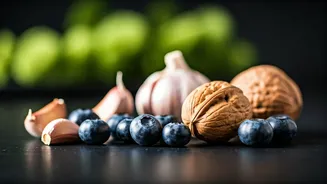Introduction to Cholesterol
Cholesterol, a waxy, fat-like substance, is vital for several bodily functions, including cell creation and hormone production. However, high cholesterol
can significantly increase the risk of heart disease and stroke. It is carried in the blood, and when there is too much, it can build up in the arteries, forming plaque that narrows the vessels. This buildup can lead to serious health problems like heart attacks and strokes. Therefore, maintaining healthy cholesterol levels is important for cardiovascular well-being, and understanding how to manage these levels through diet and lifestyle changes is crucial for overall health.
Oats: Heart-Healthy Choice
Oats are renowned for their soluble fiber content, which actively helps in lowering LDL cholesterol, often called "bad" cholesterol. Soluble fiber binds to cholesterol in the digestive system, preventing its absorption into the bloodstream. Including oats in your diet can be easily done. Starting your day with oatmeal is a simple yet effective method. You can also add oats to smoothies, baked goods, or even use them as a topping on yogurt. The key is consistency; regularly incorporating oats into your meals is essential to reap their cholesterol-lowing benefits. Oats not only support heart health but also offer sustained energy due to their complex carbohydrate profile, making them a nutritious addition to any diet.
Avocados: Healthy Fats
Avocados are rich in monounsaturated fats, which play a crucial role in lowering LDL cholesterol while increasing HDL cholesterol, often referred to as "good" cholesterol. They also provide essential nutrients such as potassium and fiber, which contribute to overall cardiovascular health. Incorporating avocados into your diet is versatile. You can add them to salads, spread them on toast, or blend them into smoothies. A half or whole avocado per day can provide the required beneficial fats without significantly increasing your calorie intake if consumed in moderation. The creamy texture and mild flavor make avocados a delightful addition to various dishes, promoting both taste and health.
Nuts and Seeds: Powerhouse
Nuts and seeds, such as almonds, walnuts, and flaxseeds, are packed with unsaturated fats, fiber, and plant sterols, all of which contribute to lowering cholesterol levels. They also provide various vitamins, minerals, and antioxidants, further boosting their health benefits. Consuming a handful of nuts or seeds daily can provide significant health benefits. They are easily consumed as snacks, sprinkled on salads, or added to yogurt and oatmeal. However, since nuts and seeds are calorie-dense, it's essential to eat them in moderation. Aim for about a quarter cup a day to get the advantages of these cholesterol-friendly foods without exceeding your daily calorie needs.
Consumption Tips
To effectively use these superfoods to manage cholesterol, consider these practical tips. Begin by gradually integrating oats, avocados, and nuts/seeds into your daily meals. For instance, start your day with oatmeal and add a handful of almonds or walnuts to it. Use avocado slices in your salads or sandwiches. When preparing meals, choose cooking methods that utilize healthy fats, such as olive oil, rather than saturated or trans fats. Combine these dietary changes with other lifestyle modifications, like regular exercise and avoiding smoking, to maximize the benefits. Regular monitoring of your cholesterol levels with the assistance of a healthcare professional is also advisable to track your progress and make appropriate dietary adjustments.












